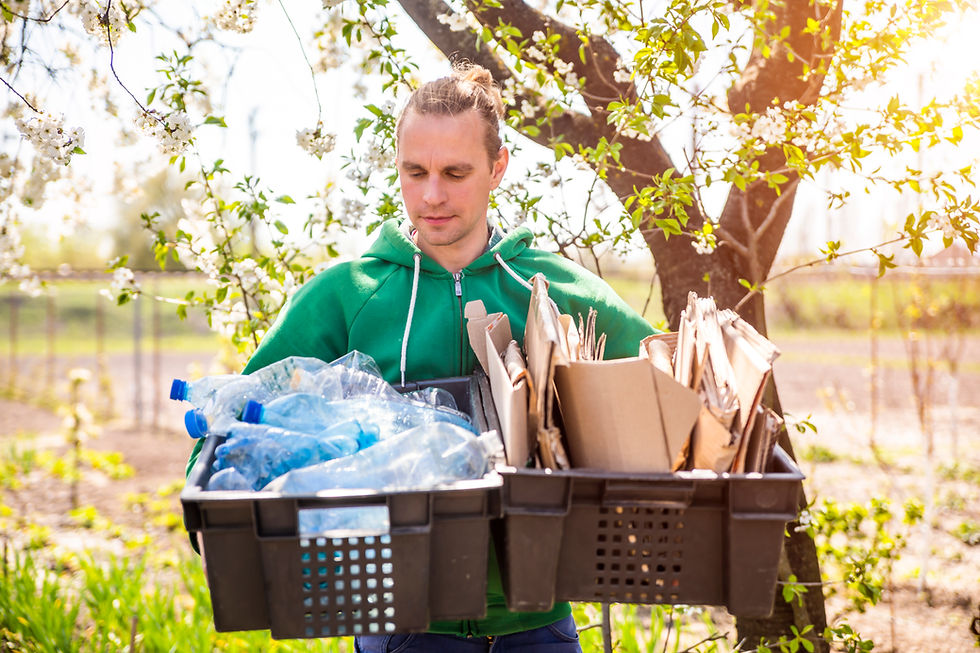Climate Anxiety & Mental Health
- Tom Bulpit MBACP

- Apr 18, 2024
- 4 min read

Hello everybody,
I hope everyone's having a pleasant week so far and that this message finds you well.
This week's topic is climate anxiety. This is a subject which may resonate with you, the inspiration for this blog came to me after many homes and businesses in my local area have been affected by flooding over the last couple of weeks.
Now I'm sure you're all doing your bit to help the environment. Placing cardboard and plastic in your recycling bins, switching off appliances or lighting in rooms you are not using to save electricity, and walking or using public transport where possible instead of taking your car. Turning your washing machine on to a lower and quicker cycle.
But climate anxiety, or eco-anxiety, can cause people to feel concerned and worried.
So what is climate anxiety, and how can it impact our mental health?
According to Yale Sustainability 'Climate anxiety is fundamentally distressing about climate change and its impacts on the landscape and human existence. That can manifest as intrusive thoughts or feelings of distress about future disasters or the long-term future of human existence and the world, including one's own descendants'.
Greenpeace, an independent global campaigning network, explains, 'It also covers the distress we feel when people around us don't get it, refuse to take action, or attack, shame, or silence us for how we feel.'
At a conference I attended last year, one lecturer presented their research, detailing how young people are now more likely to consider not reproducing because of their fears surrounding the state of the world. The lecturer continued to explain that participants had shared their uneasiness and questioned what the position of the planet would be in generations to come.

As the world gets warmer, the polar caps melt, sea levels rise, there is more extreme rainfall in shorter periods of time, landslides, coastal erosion, and more storms and droughts. Just to name a handful of effects of global warming, and the list goes on.
This causes a lot of people to lose sleep at night and to feel stressed, nervous, and hopeless.
According to Greenpeace, you are not alone. But according to the statistics, 84% of young people across the world say they feel worried about it. And 2021's census reported that 75% of adults in Britain are worried about its impact. So it's very likely you already know someone who has similar emotions to you.
Learning how to talk to family and friends about climate change and anxiety can help us process it, which I've re-listed below. All credit to Greenpeace for these tips.
How to talk to friends and family about climate change
1) Pick your moment and take your time. If you've had a bad day at work and feel frustrated to find your partner has placed an incorrect item in your green bin, now is possibly the best time to have this conversion, as your fears might be misconstrued as blame. Also, it would be an idea or suggestion to check in with the other person with whom you are going to have this conversation.
2. Don't try to 'win'. You may be surprised that other people might not share the same thoughts or feelings as yourself. Greenpeace suggests that it is not your moral duty to make people see the situation in the same light as yourself.
3. Share your story. Where possible, tell the other person how you feel and what your concerns are.
4. Listen and show you've heard. Try not to interrupt or immediately argue back, even if you disagree.
5. Ask questions. This also shows that you have really been listening to the other person's point of view.
6. Be kind to yourself. Take some time to reflect on the conversation. Did you learn anything new? Did your perspective change or remain the same?

Greenpeace advises, 'If you don't feel able to talk to anyone you know, consider finding other ways to connect with like-minded people, such as at a climate café or volunteering for Greenpeace.' or other local schemes and incentives like beach combing, litter picking, and tree planting.
Or even trying to eat more seasonal produce from your nearest farm shop instead of items such as fruit and vegetables that have been flown in from other countries. Shopping at farm shops or markets also helps local businesses and the economy. But if you cannot live without certain food products, for example, your smashed avocado on toast or your homemade pineapple smoothie, ask yourself: Is it possible for you to purchase the Fair Trade variety instead? who aims to 'promote sustainable food production and environmental protection'.
For more information on Fair Trade, their ethos, and how they are doing their bit to combat climate change, please see their website here.
Climate anxiety is a real and valid mental health concern. If you relate to this blog and have your own personal worries, you are more than welcome to book a session to discuss them with me or any other member of the team at The Empathy Project.
Yours sincerely
Charlotte
Charlotte Parker MBACP is our Counselling Director and a Person-Centred Psychotherapist. Specialising in bereavement, addiction and relationship conflict. You can see her profile or book a session with her online.




Comments